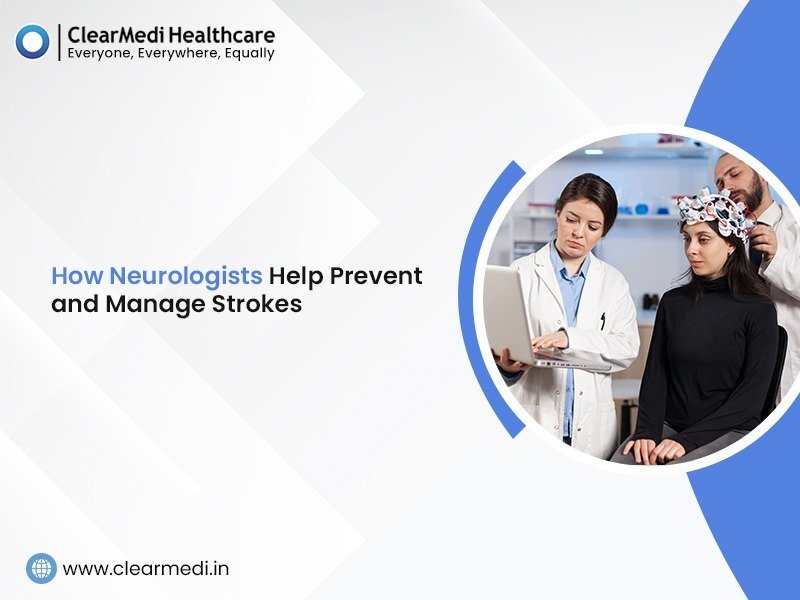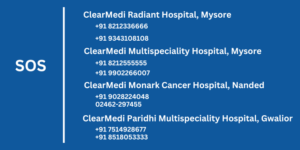Every year, more than 12 million people worldwide experience a stroke for the first time, and 6.5 million lose their lives as a result. While stroke risk increases with age, it is not limited to older adults—over 60% of cases occur in people under 70, and 16% affect those under 50. With more than 100 million stroke survivors globally, the impact of this condition is vast, affecting individuals and their families long after the initial event.
Despite these numbers, many strokes are preventable with the right medical approach. Neurologists have a pivotal role to play in identifying risks, managing underlying conditions, and providing structured care. Their competence has a wide range to take care of, from prevention to emergency intervention and long-term rehabilitation, thereby helping individuals protect their brain health and improve recovery outcomes.
Why Do Strokes Occur At First Place?
The medical experts at clearmedi healthcare state that a stroke happens when part of the brain is deprived of oxygen due to either a blocked artery (ischaemic stroke) or a burst blood vessel (haemorrhagic stroke). Without oxygen, brain cells begin to die within minutes, which is why rapid medical intervention is non-negotiable.
The most common risk factors include:
- High blood pressure – The leading cause of strokes, putting excess strain on blood vessels.
- Atrial fibrillation – An irregular heartbeat that increases the likelihood of blood clots.
- Diabetes – Contributes to blood vessel damage over time.
- Smoking – Harms blood vessels and increases clotting risk.
- High cholesterol – Leads to narrowed arteries, restricting blood flow.
What Is Your Role To Play in It?
While some risk factors, such as age or genetics, are beyond control, many are manageable with the right approach. Regular check-ups, lifestyle adjustments and medical interventions can significantly lower stroke risk. Neurologists help you take a proactive role in your health by providing personalised guidance, monitoring key indicators, and recommending preventive treatments when necessary.
Preventing Strokes: The Neurologist’s Role
Prevention of stroke is all about maintaining long-term brain health. Neurologists emphasise early action and personalised interventions, such as:
- Cholesterol and high blood pressure management – Important in reducing blood vessel strain.
- Detection and treatment of atrial fibrillation – Preventing clotting that may cause a stroke.
- Maximising diabetes care – Preparing blood vessels against long-term damage.
- Guiding lifestyle modifications – Helping individuals adopt heart-healthy habits.
- Prescribing preventive medication – Blood thinners or antiplatelet drugs for high-risk individuals.
Immediate Neurological Intervention
When a stroke occurs, the timely actions of medical experts are everything. Neurologists aid in speeding up diagnosis and treatment, which can involve:
Thrombolysis (clot-busting drug) – It is applied within a short time frame for ischaemic strokes.
Mechanical thrombectomy – The large clots in the patient’s arteries are removed.
Emergency haemorrhage control – Stabilising bleeding in haemorrhagic strokes.
By acting swiftly, the top neurologist in Mysore helps minimise brain damage and improve recovery outcomes.
Stroke Recovery and Long-Term Management
Beyond the immediate emergency, stroke recovery is a long-term process. Neurologists coordinate rehabilitation efforts for maximising recovery, including:
- Physical and occupational therapy – Restoring movement and daily function.
- Cognitive support – Addressing memory, speech, and concentration difficulties.
- Medication adjustments – Managing ongoing risks to prevent a second stroke.
- Mental health care – Addressing emotional challenges that often follow a stroke.
When to See a Neurologist
Early intervention can be life-changing. Consider seeing a neurologist if you:
- Have a history of stroke or transient ischaemic attack (TIA).
- Have high blood pressure, diabetes, or cardiovascular issues.
- Experience sudden neurological symptoms, such as numbness, vision changes, or speech difficulties.
- Want to have a fair understanding of your stroke risk and take preventive action.
Building a Stroke-Resilient Future
Neurologists don’t just treat strokes—they help prevent them. Whether by managing risk factors, guiding emergency care, or supporting long-term recovery, their expertise plays a vital role in reducing stroke-related complications. Taking proactive steps, seeking expert care, and making informed health choices can make all the difference in protecting brain health for the future.
Act Early, Stay Protected—Safeguard Your Brain
Stroke is a major health concern, but with early detection and expert care, the risks can be significantly reduced. Recognising symptoms, seeking prompt medical attention, and following preventive measures can help safeguard brain health and improve recovery outcomes.
If you or a loved one are experiencing signs of a stroke or have concerns about neurological health, don’t wait—consult a specialist immediately at clearmedi healthcare. Timely intervention can prevent severe complications and support long-term well-being.
For expert stroke care and neurological treatment, visit ClearMedi Radiant Hospital, Mysore, where Dr. Gunal V, Consultant – Neurology, provides specialised care. With 8.5 years of experience and advanced training (MBBS, MCh Neuro Surgery), Dr Gunal V offers comprehensive treatment for stroke prevention, acute management, and rehabilitation. OPD Timings: 10.00 AM – 5.00 PM.
Also Read About:
From Diagnosis to Recovery: The Comprehensive Gastroenterology Services We Offer
Radiation Oncology in Pediatrics: Special Considerations and Challenges


